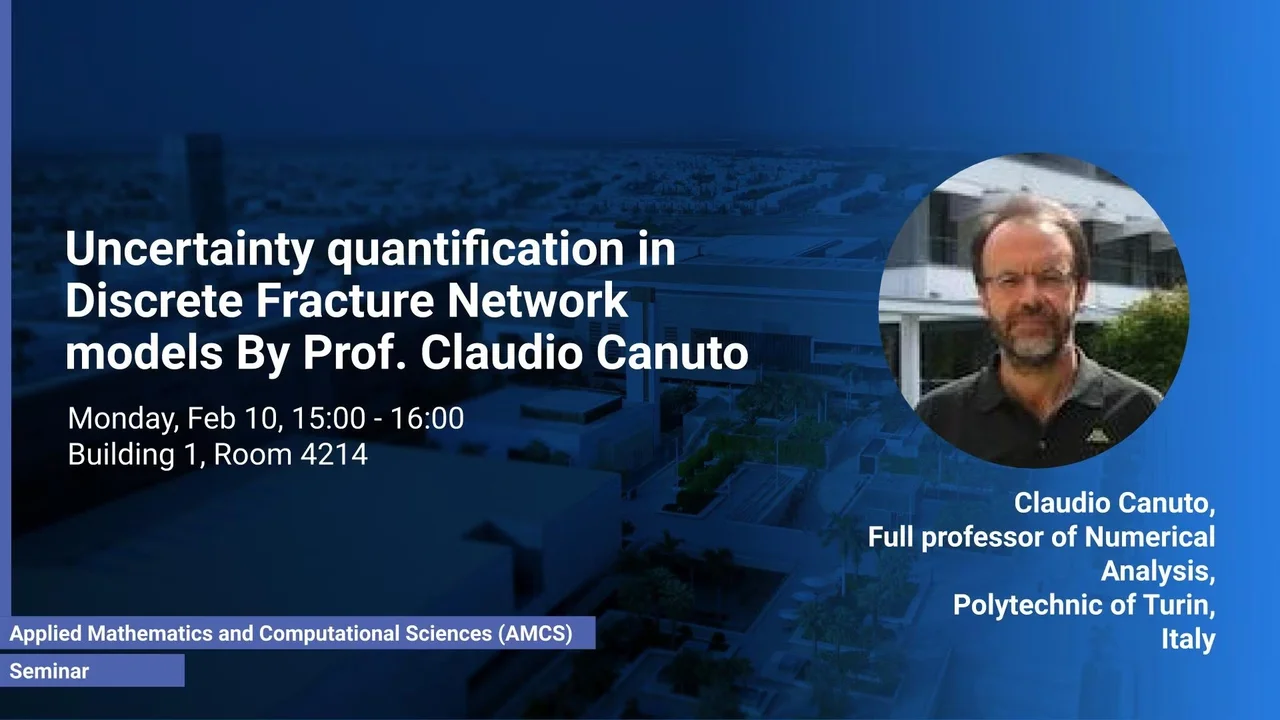
Uncertainty quantification in Discrete Fracture Network models By Prof. Claudio Canuto (Dipartimento di Scienze Matematiche, Politecnico di Torino, Italy)
Discrete Fracture Network (DFN) models are widely used in the simulation of subsurface flows; they describe a geological reservoir as a system of many intersecting planar polygons representing the underground network of fractures. Among the different approaches to DFN simulations, recently (Berrone et al, 2013) a numerical model has been formulated as a PDE-constrained optimization problem, in which neither fracture/fracture nor fracture/trace mesh conformity is required.
Overview
Abstract
Discrete Fracture Network (DFN) models are widely used in the simulation of subsurface flows; they describe a geological reservoir as a system of many intersecting planar polygons representing the underground network of fractures. Among the different approaches to DFN simulations, recently (Berrone et al, 2013) a numerical model has been formulated as a PDE-constrained optimization problem, in which neither fracture/fracture nor fracture/trace mesh conformity is required. Each fracture is endowed with its own FEM mesh, and Extended FEMs (XFEMs) are simply added to enhance resolution along the traces (fracture intersections). An alternative discretization based on the Virtual Element Method (VEM) is also feasible. While the flow model considered so far is deterministic (once a network of fractures is randomly generated), we will present the first results for a stochastic version of the model. Stochasticity is inserted in two ways: i) in the transmissivity coefficients of the fractures, assuming the fracture network given; ii) in the generation of the network, considering as stochastic such parameters as the location of fractures, their orientation, their size. In the latter case, fracture intersections may appear or disappear while varing the stochastic parameters. An Uncertainty Quantification analysis is performed, based on a collocation approach over sparse grids in parameter spaces.
Brief Biography
After being a researcher at the Istituto di Analisi Numerica del CNR in Pavia with E. Magenes and F. Brezzi, he became full professor of Numerical Analysis in 1986. His scientific activity is addressed to the study of discretization methods for partial differential problems, with a particular emphasis on high-order and multi-level methods, and applications to Fluid Dynamics. A relevant portion of his scientific production concerns the study of spectral methods, for which in the 80’s he contributed with others to start and develop the numerical analysis. Other research topics include wavelet methods, coupling of models, uncertainty quantification, Eulerian models of dynamics on networks. He was plenary speaker at such conferences as ICIAM'07 Zurich and ENUMATH'97 Heidelberg; member of the Scientific Board of ENUMATH and ICOSAHOM (co-founder with A. Quarteroni); associate editor of such journals as SIAM J. Numerical Analysis, J. Scientific Computing, M2AN, CMAME; team leader of several EU-funded Projects.
He is member of the Scientific Board of the Italian National Institute for Advanced Mathematics (INDAM).
Refreshments: Available in 4214 @ 2:45 pm
